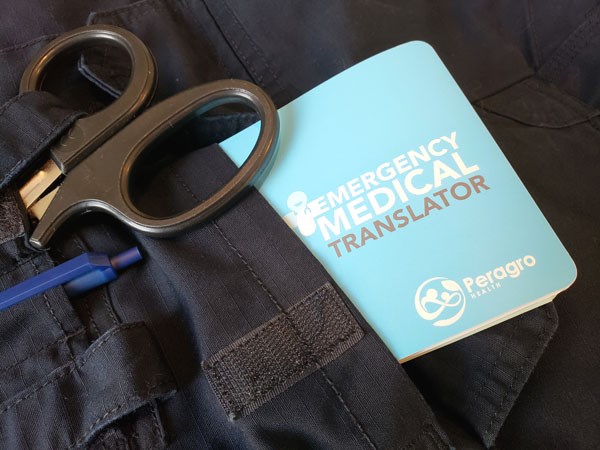Madeira Park-based paramedic James Shearer has created a translation tool to help people responding to medical emergencies communicate with patients they don’t have a language in common with.
“There really wasn’t something that was specifically designed for paramedics and medical first responders, and that sort of surprised me and set me on the path to create something that had a specific purpose and understood the specific environment that we work in,” Shearer told Coast Reporter.
The Emergency Medical Translator is also unique in this age of smartphones, because it’s not an app, or a translation-by-phone service. It’s a hands-on tool printed on a lightweight plastic that “is easily cleaned and holds up to the demanding pre-hospital emergency environment.”
The booklet, which is also designed to fit easily in a paramedic’s uniform pocket, uses words and symbols to allow communication with patients in nine languages commonly spoken in B.C. using a “point and observe” approach.
Shearer said one of the other reasons he felt paramedics needed something that went beyond a smartphone translation app or standard translation services was the specialized language they use and the need to quickly understand.
He used the example “seizure,” which a paramedic or doctor would instantly take to mean a medical condition, but might get confused in translation with its other meanings.
He also said the translation system needed to bridge the gap between medical jargon and common words.
“The translation had to be accurate, but it also had to be ‘lay speak’. The initial translations were all done by medical professionals in the origin country of the language, then they were reviewed by people who were not medical professionals,” Shearer said. “If I asked a Chinese physician to translate heart attack and they come back with [the Chinese for] myocardial infarction – great. That might mean what I know it means and what he knows it means, but when a lay person looks at it they don’t know.”
Shearer has been testing a few prototypes, which he said have gone over well, and now he’s mounted an Indiegogo fundraising campaign to get money to do a production run. There’s been interest and support so far from all over the English-speaking world, he added.
As of Nov. 5, Shearer had raised around $5,000 of the $9,500 he needs to get beyond the prototype stage.
The fundraising website is indiegogo.com/projects/emergency-medical-translator



